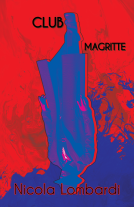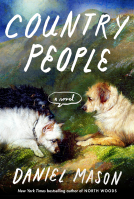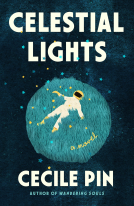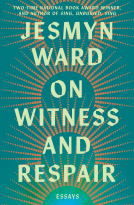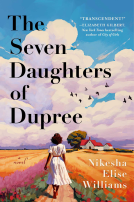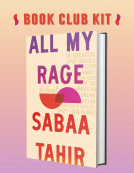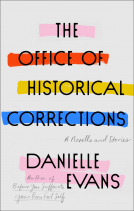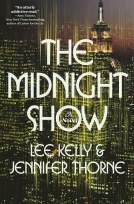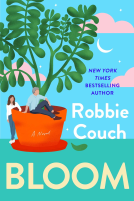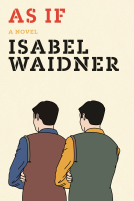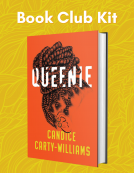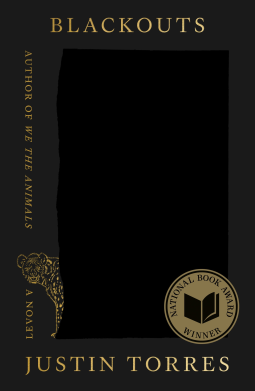
Blackouts
A Novel
by Justin Torres
This title was previously available on NetGalley and is now archived.
Send NetGalley books directly to your Kindle or Kindle app
1
To read on a Kindle or Kindle app, please add kindle@netgalley.com as an approved email address to receive files in your Amazon account. Click here for step-by-step instructions.
2
Also find your Kindle email address within your Amazon account, and enter it here.
Pub Date Oct 10 2023 | Archive Date Nov 30 2023
Talking about this book? Use #Blackouts #NetGalley. More hashtag tips!
Description
Winner of the National Book Award
Winner of the California Book Award
Winner of Tournament of Books
Out in the desert in a place called the Palace, a young man tends to a dying soul, someone he once knew briefly but who has haunted the edges of his life: Juan Gay. Playful raconteur, child lost and found and lost, guardian of the institutionalized, Juan has a project to pass along, one built around a true artifact of a book—Sex Variants: A Study of Homosexual Patterns—and its devastating history. This book contains accounts collected in the early twentieth century from queer subjects by a queer researcher, Jan Gay, whose groundbreaking work was then co-opted by a committee, her name buried. The voices of these subjects have been filtered, muted, but it is possible to hear them from within and beyond the text, which, in Juan’s tattered volumes, has been redacted with black marker on nearly every page. As Juan waits for his end, he and the narrator recount for each other moments of joy and oblivion; they resurrect loves, lives, mothers, fathers, minor heroes. In telling their own stories and the story of the book, they resist the ravages of memory and time. The past is with us, beside us, ahead of us; what are we to create from its gaps and erasures?
A book about storytelling—its legacies, dangers, delights, and potential for change—and a bold exploration of form, art, and love, Justin Torres’s Blackouts uses fiction to see through the inventions of history and narrative. A marvel of creative imagination, it draws on testimony, photographs, illustrations, and a range of influences as it insists that we look long and steadily at what we have inherited and what we have made—a world full of ghostly shadows and flashing moments of truth. A reclamation of ransacked history, a celebration of defiance, and a transformative encounter, Blackouts mines the stories that have been kept from us and brings them into the light.
A Note From the Publisher
Advance Praise
“Blackouts is a historic feat of literature. I’ve never read a book so brilliantly inventive. ‘Must-read’ and ‘masterpiece’ don’t do the book justice. A marvel of the human mind.” —Javier Zamora, author of Solito
“Erotic and beguiling, Blackouts prowls the negative spaces that surround our identities, our memories, and our desires, inviting us to think about erasure and collage not just as literary techniques, but as psychological processes, and even as radical acts of cultural and sexual reframing. An intelligent, loving, and genuinely subversive work.” —Eleanor Catton, author of Birnam Wood
“Blackouts gives me what I read fiction for, what I read for at all—the sense of a brilliant mind creating a puzzle in the air in front of me, all intelligence and surprises. Ambitious, disarming, full of a kind of daring that winks as it passes—as if David Wojnarowicz rewrote Nabokov’s Pale Fire and then left it for years in an abandoned building, just for you.” —Alexander Chee, author of How to Write an Autobiographical Novel
“Justin Torres is a master of the urgent, surprising sentence. In Blackouts, he pays close attention to every word, crafting a narrative that is as much about what is on the page as what has been painstakingly cut away. This novel is a stunning achievement of re-creation, imagination, and tender, tender care. Read it and feel held.” —Angela Flournoy, author of The Turner House
“It’s coming. It’s coming. Ring the church bells. Alert the media. The amazing Justin Torres has a new book. We the Animals, his first novel, was so incredible, so impeccably fabulous, that I began a ritual of rereading it every few years, and after every reread I wondered when Torres, one of our great writers, would come out with a second. The wait is over. It’s coming. Gird your loins. I shiver with anticipation.” —Rabih Alameddine, author of The Wrong End of the Telescope
“Blackouts is unequivocally brilliant, bold, and structurally inventive. Like its absorbing narrator, who tells stories to keep his friend alive, Justin Torres has written a shamelessly vital novel that reminds us all not to give up on ourselves, on one another, or on our stories.” —Angie Cruz, author of How Not to Drown in a Glass of Water
“I’m crushed out on Justin Torres’s writing: charming, sexy, soft, and full of truth. His words cut like Cupid’s arrow.” —Brontez Purnell, author of 100 Boyfriends
“Enigmatic, spine-tingling, imbued with inky atmosphere and radiant disclosures—a book like a magic trick.” —Jeremy Atherton Lin, author of Gay Bar
“Blackouts is a beautiful collage of a novel. Throughout, Justin Torres quenches a thirst one scene, one flashback, one image at a time.” —Alejandro Varela, author of The People Who Report More Stress
Available Editions
| EDITION | Other Format |
| ISBN | 9780374293574 |
| PRICE | $30.00 (USD) |
| PAGES | 304 |
Available on NetGalley
Average rating from 76 members
Featured Reviews
 Bookseller 1110153
Bookseller 1110153
It's been over a decade since "We the Animals" burst onto the literary scene and changed America's view of the power punch a slim novel could deliver. Then we waited and waited for the second novel to appear. It didn't. Still, we waited. Lucky for us, the wait is over. Blackouts delivers the same one two punch as Torre's first novel. Let's just hope we don't have to wait another decade for the next one. His writing is just too delicious to be without for such long stretches of time.
 Andrija F, Educator
Andrija F, Educator
It takes a great skill to weave queerness, race, class, gender together with history, medicine, politics, economy, and a great talent to weave these in such a way to tell a story as poignant as this one. However, it takes an artist to produce an artwork, and especially an artwork from the ways various oppressive discourses erase those who appear at the intersection of these aspects of being in the world as the most powerless. Beautiful novel.
Blackouts is so brilliant that it's occupied all my shower-thinking-time for a week, but whenever I try to tell people (everyone...I've been telling everyone) what it's about, I can't quite do it. Not wholly. And this fundamental failure at communication is perhaps the most honest representation of Justin Torres's new novel, which traces a queer history that is necessarily and purposefully incomplete, which tries to "undo erasure through more erasure." Blackout poetry is a useful reference point, both in terms of the novel’s structure and in terms of its content. Torres intersperses narrative with partially blacked-out pages from Sex Variants, a study of homosexuality published in 1941, and the novel itself makes an argument for the way that storytelling is always an act of focus, of emphasis and elision rather than faithful reproduction. (Side note: I want someone to put this book on a syllabus with After Sappho, and then I want to take that class.)
The novel is essentially a prolonged conversation between two queer men: one dying, one witnessing. The stories they take turns telling each other are from their lives and the lives of others, and they jump through time, space, and genre depending on the desire of the listener. The result is a kind of queer archive, with historical figures, literary references, and images woven together with personal narrative, including Torres's own previously published writing. Nothing feels quite finished, but that's the point: the collage is closer to truth than a resolution could be. Blackouts is queer history that queers history, and it's perfect.
Thank you to Farrar, Straus and Giroux and NetGalley for the ARC!
 Reviewer 712890
Reviewer 712890
A wild, haunting, mesmerizing read. “We the Animals,” Justin Torres’s first novel, was formative for me. And even though I’m still processing “Blackouts,” I know it will be the same, and it currently lives rent-free in my mind.
The novel is an intricate and masterful collage of various factual and fictional texts – including the author’s previous work, redacted medical studies, the DSM, illustrations, photographs, and conversations between the narrator and his companion Juan Gay. The two met years ago when they were both institutionalized, and now, as Juan is dying in a place known as “The Palace,” the young narrator seeks him out. Throughout “Blackouts,” Juan and the narrator trade stories of their own lives, recounting their memories in formats as wide-ranging as a screenplay and a story told in reverse chronology, and Juan passes on his (fictionalized) remembrances of the real-life Jan Gay, whose 1941 study “Sex Variants: A Study in Homosexual Patterns” is central to the novel. This kind of oral storytelling, and the way that remembrances are filtered through multiple sources, including the narrator (who acknowledges the fallibility of his own “remembering of [Juan’s] remembrances”) is such a beautifully queer way to examine how queer history itself has survived, albeit incompletely, and despite erasure, exaggeration, distortion, oppression. Still, as porous as the line between fact and fiction is, the artifacts presented here have a deep, clear truth and resonance. This novel is so, so special.
Readers who liked this book also liked:
Nikesha Elise Williams
General Fiction (Adult), Multicultural Interest
We Are Bookish
Multicultural Interest, OwnVoices, Teens & YA
Lee Kelly; Jennifer Thorne
General Fiction (Adult), Humor & Satire, Literary Fiction
We Are Bookish
Literary Fiction, Multicultural Interest, Women's Fiction
